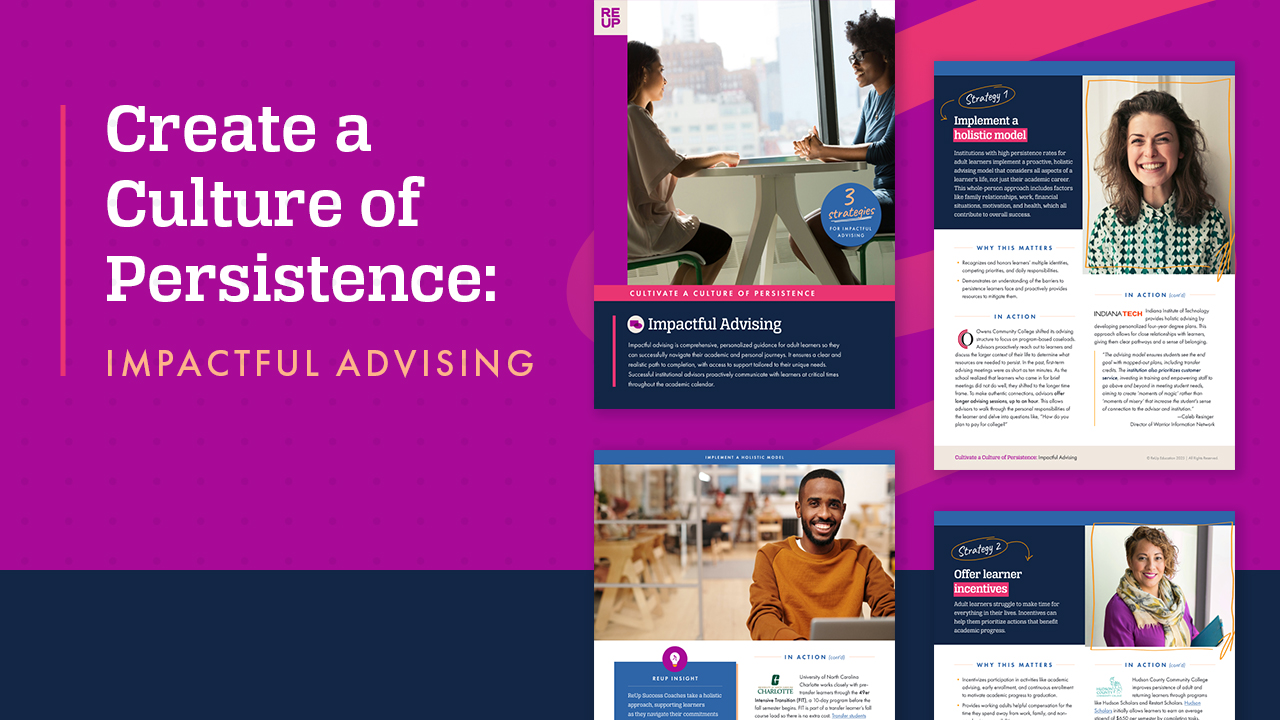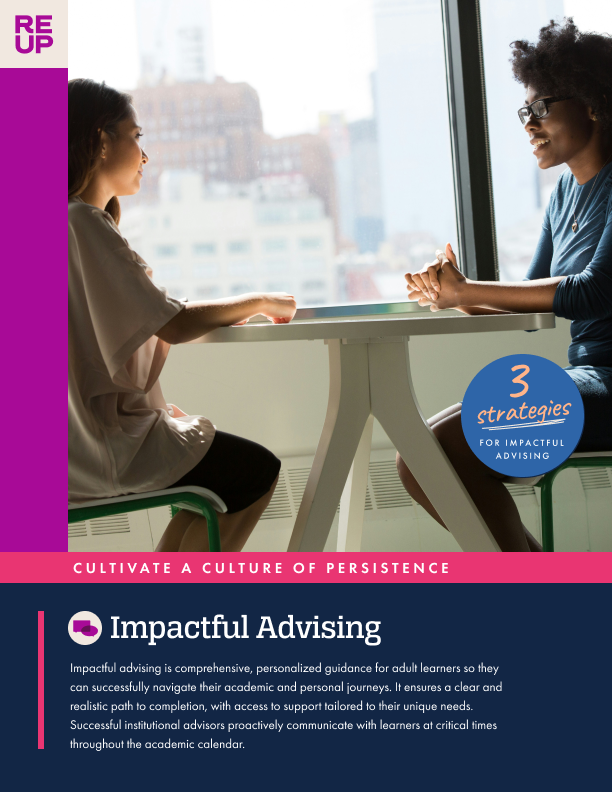5 Ways Impactful Advising Boosts Adult Learner Success

Building a one-on-one relationship with adult learners is an essential part of a successful return to higher education.
For adult learners, advising is about more than course registration and semester schedules; it’s about building trust and support so they can reach academic goals. These learners juggle jobs, families, and financial obligations, which can make persistence a significant challenge. Effective one-on-one advising can change a learner’s relationship with an institution. Here are five ways advising boosts learner persistence, illustrated with real-world examples from ReUp partners.
1. Implement holistic advising models for adult learners
The most effective advising approaches go beyond academics. Holistic advising considers the “whole person,” addressing learners’ personal, financial, and professional realities. Owens Community College set a powerful example by shifting to a program-based approach. Advisors now spend up to an hour with learners, asking meaningful questions like, “How do you plan to pay for college?” These deeper conversations help address barriers, whether it’s finances or family commitments, and ensure learners feel fully supported in their academic and personal lives.
Why it works: When learners feel seen and supported—not just academically but holistically—they’re better equipped to persist.
2. Proactively communicate with adult learners throughout the semester
Timely communication plays a critical role in learner persistence. Institutions like the University of North Carolina Charlotte maintain consistent contact with learners, especially during pivotal moments like registration, the start of semesters, or before exams. Proactive advisors focus on creating moments of guidance before problems turn into obstacles.
“It’s about identifying the points at which students need to hear from an advisor, and then having them hear from the advisor,” said Dr. Lisa Walker, Associate Provost for Undergraduate Education and Dean at UNC Charlotte. “Advising consistency is also important … A lot of the improvements we’ve seen in persistence are due to that process.”
Why it works: Proactive advising keeps learners supported before issues arise, giving them the confidence to handle challenges.
3. Create clear end goals through personalization
One of the biggest motivators for adult learners is having a clear plan to achieve their goals. At Indiana Tech, advisors create personalized four-year degree plans, laying out pathways that include transfer credits and career trajectories. This helps learners feel a stronger connection to their goals while providing a sense of belonging within the institution. The school couples this with what Director Caleb Resinger calls “moments of magic,” like exceptional customer service and empowering staff to go above and beyond. This level of personalization helps create a sense of direction and belonging.
Why it works: Personalization instills confidence and clarity. When learners see a detailed path to their end goal, they’re more motivated to stay on track.
4. Offer incentives that prioritize education
Adult learners often face competing priorities. Offering incentives helps them refocus on academic progress. Westmoreland Community College takes this a step further by addressing the unique needs of single-parent learners. They incentivize participation in peer support groups, offering $50 per session to learners who exchange advice on juggling parenting and studying. This approach not only reduces isolation but also gives learners the practical motivation to prioritize their education.
Why it works: Incentives provide the push needed for learners to prioritize their education alongside other responsibilities.
5. Integrate career-focused advising
Connecting education to career goals is another highly effective strategy. At the University of Idaho, career consultants are embedded in every department to help learners tie their academic experiences directly to their professional ambitions. Tools like career assessments further guide learners in identifying majors and making informed career decisions. This targeted career-focused advising emphasizes the practicality of education, transforming it into a tool for job readiness.
Why it works: When learners see a clear link between their studies and their career dreams, they’re more engaged and committed to persisting.
Strengthen persistence with impactful advising strategies
Advising that’s tailored to the unique needs of adult learners can foster persistence. For actionable strategies, insights, and inspiring examples from institutions, download our guide, “Cultivate a Culture of Persistence: Impactful Advising.”
Let’s start the conversation
Schedule a call with a ReUp team member to learn more about what a ReUp partnership could do for your institution.
